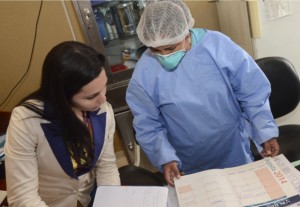Education
Division of Infectious Diseases:
EDUCATION

Center for Global Health Scholar Christine Briscoe (left), in Lima, Peru, with staff member from Socios en Salud, the Peruvian branch of Partners in Health.
The division’s long-time commitment to the education of world-class physicians and scientists in infectious diseases is reflected in the numerous teaching honors garnered by ID faculty over the years. This year, division chief William Petri received the State Council of Higher Education for Virginia Outstanding Faculty Award; and Rebecca Dillingham received a 2014 All-University Teaching Award. Division faculty also provide key leadership for the Department of Medicine’s medical educational programs: Gerald Donowitz serves as Vice Chair and Brian Wispelwey as Associate Chair for the graduate and undergraduate programs, respectively. Barbara Mann coordinates efforts to match graduate students to infectious diseases and biodefense labs.
The division’s Graduate Infectious Diseases Research Training program is now in its fourth decade, with interdisciplinary PhD, postdoctoral and medical fellowship programs that encompass biodefense and global health. Richard Pearson directs the program, and under his leadership, all three graduates of the program in 2014 accepted academic positions, one with an NIH-K08 award and another with a K23 award. The ID graduate programs currently include:
- ID and Biodefense PhD program (8 predoctoral fellows)
- Clinical fellowship program (5 MD fellows)
- D and Biodefense research fellowship program (2 postdoctoral fellows)
The centerpiece of the program, supported by two long- standing NIH T32 training grants and foundation funding, is the side-by-side education of PhD students, scientific and medical postdoctoral fellows, who share classes and work together on basic and clinical research projects. The 36 faculty who teach and mentor in the program are drawn from seven different departments, with an array of expertise in fields such as microbiology, pathology, immunology and epidemiology. The average preceptor in the program has trained more than ten pre- or postdoctoral students. In the last five years, 12% of the positions awarded have been to underrepresented minorities and individuals with a disability; women currently constitute 54% of trainees and 23% of preceptors.
Richard Guerrant, Rebecca Dillingham and Pascal Bessong are serving as co-investigators on a training grant in Global Infectious Diseases Research that will provide training grants for one fellow and three graduate students annually from the University of Venda, South Africa, for training at the University of Virginia under mentorship of Infectious Diseases faculty members.
Thanks to the leadership of Professor Barbara Mann and the hard work of many, the Biodefense Research Training Grant T32 was successfully renewed in 2014 for another five years, with a score of 14 (out of a range of 10 to 100, with 10 being the best). Projects receiving major awards are usually long-term activities supported by multiyear continuing grants, and require continued oversight by the granting agency. Periodic decisions must also be made on whether or not to renew support when the grant expires, which occurs at least every five years. The ongoing evaluation process typically involves annual reports from the project, visiting committees, and site visit evaluations by funding staff and advisors.
The clinical fellowship program consists of two broad areas: clinical training in the care of ambulatory and hospitalized patients with infectious diseases, and research training focused on the development of the skills necessary to become a successful independent investigator. The first year is devoted entirely to research, with no clinical responsibilities; this allows for more rapid development of research skills, which leads to more productive research during the clinical years of training and higher degree of success in scholarship after the training period. During the second and third years of training, fellows have rotations in inpatient and outpatient settings while continuing to refine research skills and work on projects initiated in the first year.
During FY 2014, Infectious Diseases fellows were:
- 3rd year Luther Bartelt, Poonum Korpe, Rajat Madan, all three of whom were awarded prestigious career development (“K”) awards from the NIH
- 2nd year Jessica Lewis, Shannon Moonah, James Platts-Mills
- 1st year Ashley Chaplin, Patrick Jackson, Kirsten Schutte
The Division of Infectious Diseases is one of a handful of programs in the country that offer a certificate in Tropical Medicine and Travelers Health. Run in association with the American Society of Tropical Medicine and Hygiene, the certification course includes seminars, conferences, laboratory training, and outpatient experience, with particular emphasis on tropical medicine.
